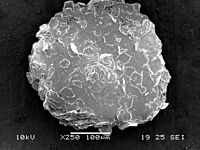
Photo from wikipedia
Extensive documentation is available on plant essential oils as a potential source of antimicrobials, including natural drugs against Candida spp. Yeasts of the genus Candida are responsible for various clinical… Click to show full abstract
Extensive documentation is available on plant essential oils as a potential source of antimicrobials, including natural drugs against Candida spp. Yeasts of the genus Candida are responsible for various clinical manifestations, from mucocutaneous overgrowth to bloodstream infections, whose incidence and mortality rates are increasing because of the expanding population of immunocompromised patients. In the last decade, although C. albicans is still regarded as the most common species, epidemiological data reveal that the global distribution of Candida spp. has changed, and non-albicans species of Candida are being increasingly isolated worldwide. The present study aimed to review the anti-Candida activity of essential oils collected from 100 species of the Lamiaceae family growing in the Mediterranean area and the Middle East. An overview is given on the most promising essential oils and constituents inhibiting Candida spp. growth, with a particular focus for those natural products able to reduce the expression of virulence factors, such as yeast-hyphal transition and biofilm formation. Based on current knowledge on members of the Lamiaceae family, future recommendations to strengthen the value of these essential oils as antimicrobial agents include pathogen selection, with an extension towards the new emerging Candida spp. and toxicological screening, as it cannot be taken for granted that plant-derived products are void of potential toxic and/or carcinogenic properties.
Journal Title: Antibiotics
Year Published: 2020
Link to full text (if available)
Share on Social Media: Sign Up to like & get
recommendations!